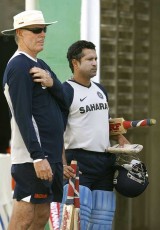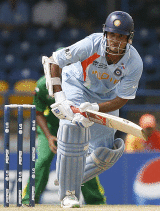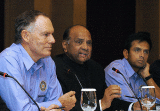
|

Greg Chappell's report to the board is expected to be scathing in its criticism of the senior players including Sourav Ganguly, Sachin Tendulkar, Virender Sehwag and Harbhajan Singh
© AFP
|
|
Of all the challenges the Board for Control of Cricket in India has faced in the recent past, this could turn out to be the toughest one. When the working committee of the BCCI meets on April 7, following the meeting of the review committee the day before, they will have to choose between the leadership of the Indian team - Greg Chappell and Rahul Dravid - and the senior players. The division is sharp, complete and has reached a point of no return.
Cutting to the chase, the issue is a simple one. There's a coach who wants a team he can take control of, and mould according to his vision. There are a group of players who would prefer a coach they can control. And there is a board that would prefer to have control over both of these factions.
From all accounts, Chappell's report, due to be submitted to the board before April 6, will be scathing in its criticism of the attitude of the senior players including Sourav Ganguly, Sachin Tendulkar, Virender Sehwag and Harbhajan Singh. It is learnt that Chappell, and some members of the board, believe that the return of Ganguly, and later on Tendulkar's captaincy aspirations, had a destabilising effect on the team, forming groups within the eleven and perhaps stifling the growth of some of the younger cricketers trying to make a mark.
Although Ganguly has scored runs since his return to the one-day team, there is a belief that, on occasion, he may have been batting more to retain his place in the team than in the best interests of what the situation demanded. The reports that Chappell and Sanjay Jagdale, the team manager in the Caribbean, present are likely to point to instances where, for example, instructions sent out to Ganguly asking him to accelerate were ignored.
Meanwhile, almost the entire team, and it is believed that all but Irfan Pathan and Sreesanth have reached the end of the tether with Chappell, have rallied together against Chappell and Dravid and want Tendulkar to take up their case to the board. If they had their way, Tendulkar would be the next Indian captain.
"Give us a foreigner, give us an Indian, give us anyone but him," said one player about Chappell on condition of anonymity. "Chappell was a great player, he's a brilliant batting coach, but he has not done any good for this team. He has no respect for the players and looks to blame one of them any time the team loses. A coach is supposed to give the players confidence, not create insecurity in the team."
And this is not an isolated feeling. "Does he understand the pressure Tendulkar is playing under before he questions his fitness or attitude?" asked another player. "Remember one thing, coaches come and go, but the boys are what is important. We have to play with each other through our careers."
When the players speak of Chappell, the words "manipulative" and "untrustworthy" repeatedly come up. What is even more worrisome, though, is the sense that several members of the team have lost faith in their captain. There is a strong belief among the senior group that Dravid had bought into Chappell's ways too much, and had "not stood up" for them more until recently, when he backed Sehwag and Harbhajan against Chappell's wishes. A direct fall-out of this is that the players want Tendulkar to take up their cause with the board president, and even take on the reins of the captaincy he relinquished years ago. It's been about two months since Tendulkar was made vice-captain, and there has been every indication since that he is ready to take up the hot seat, should the occasion arise.

|

It is believed that instructions sent out to Ganguly by the team management to accelerate his scoring were ignored
© AFP
|
|
Meanwhile Dravid retreated with his wife and young son to a beach in Kerala, far from the action that is happening across the corridors of power in Indian cricket. It might not come as surprise if he politely but firmly turns down the captaincy even if it was offered to him again.
In all this, the role of Jagdale will be critical. In the case of what has become Chappell's word vs that of the players, the report of Jagdale, who is seen to be both fair and apolitical, will carry weight. It is understood that Jagdale was at the very least surprised, and at worst shocked by the attitude of some of the players during the World Cup. Whether he will put forward these views to the BCCI remains to be seen.
While speculation has reached fever pitch, it is becoming clear that there is as yet no consensus among the powers that be about the way forward. "There has been no decision taken yet. We have not received any reports and till we meet the coach and manager and receive their reports there is no question of deciding what the course of action should be," a top functionary of the board said. "All these leaks and the misinformation coming out in the media only undermine what we are trying to do."
There's an uneasiness about the team that has virtually ensured that they cannot play as a unit. It is up to the committee to find out whether this has been caused by Chappell - and his tendency to speak rather freely against the players to members of the press, and the selection committee - or by players hanging on to their own best interests rather than the team's cause. .
While it is untrue that Chappell has indicated to the board that he does not wish to continue as coach, it is also fair to assume that he will not take the job if the status quo is maintained. There are stories doing the rounds that the objections of prominent former cricketers - some of whom will be giving their views to the BCCI on the afternoon of April 6 - and factions of the board are more against Ian Frazer, the assistant coach, than Chappell. But, at least at the moment, no preconditions - like Frazer's exit - have been made to Chappell in any parley the board has had with Chappell since the World Cup. One thing is clear: after submitting his report on April 6, Chappell won't be hanging around in a South Mumbai hotel room, armed policemen outside. He will be out of the country, awaiting the BCCI's decision.

|

Whose account will Sharad Pawar believe?
© AFP
|
|
One of the prime reasons why the board has been unable to reach a decision on the immediate course of action is that they are divided among themselves. There are those who believe that Dravid has done no wrong and must go on. There are some that believe that some of the senior players are not pulling their weight, and are the real problem. There are still others who believe that the simplest thing to do would be to get rid of Chappell and move on - where to, is another matter.
There is also a school of thought that believes that Sunil Gavaskar might do the job better, if there is need for a change, and it is believed - despite his extensive television commentary commitments - that he is not averse to the idea, however incredible that may seem. That might just suit the board perfectly, for there are few in India who will publicly criticise Gavaskar, even if the team fails under his tutelage.
What it will all boil down to, in the end, is what Sharad Pawar, the BCCI president, believes. Pawar, whose not inconsiderable duties as federal minister for agriculture have often led to a situation where he could not have been as hands-on as a board president should have been, is believed to rely heavily on certain trusted lieutenants for intelligence on what is happening. In recent times though, troubled as they are, he has been conspicuously present in the cricketing public eye, and recently said, "First we have to decide if we want to change the coach. If we want to, then we'll decide who will do the job better."
Anand Vasu is assistant editor of Cricinfo





